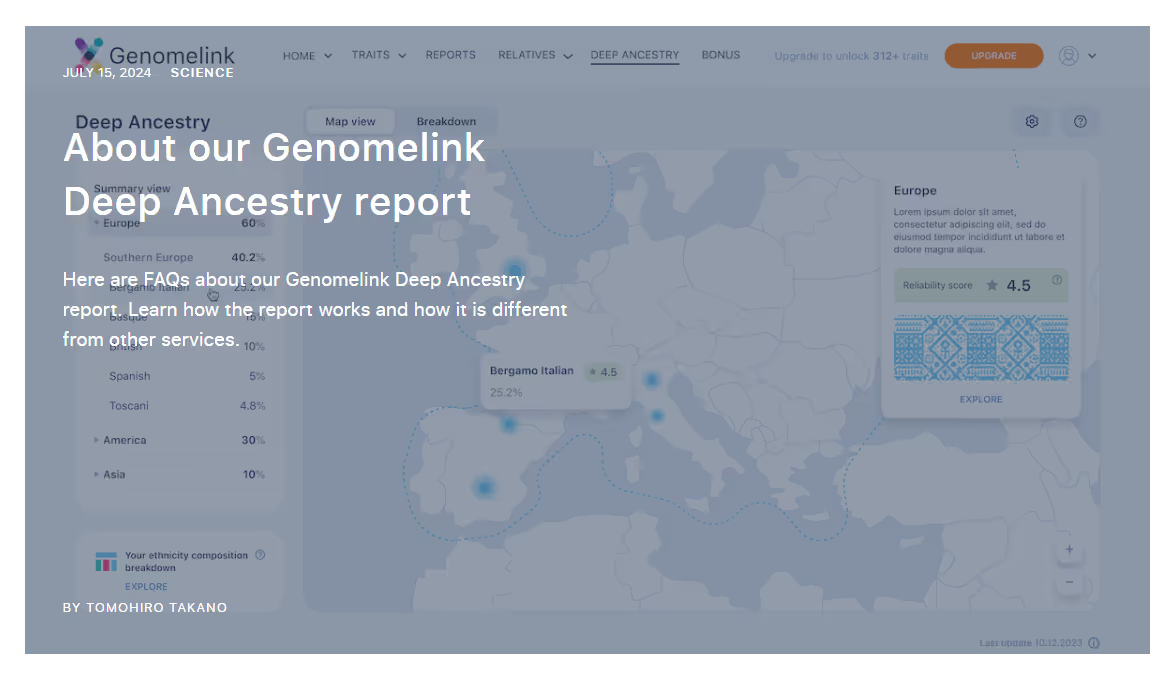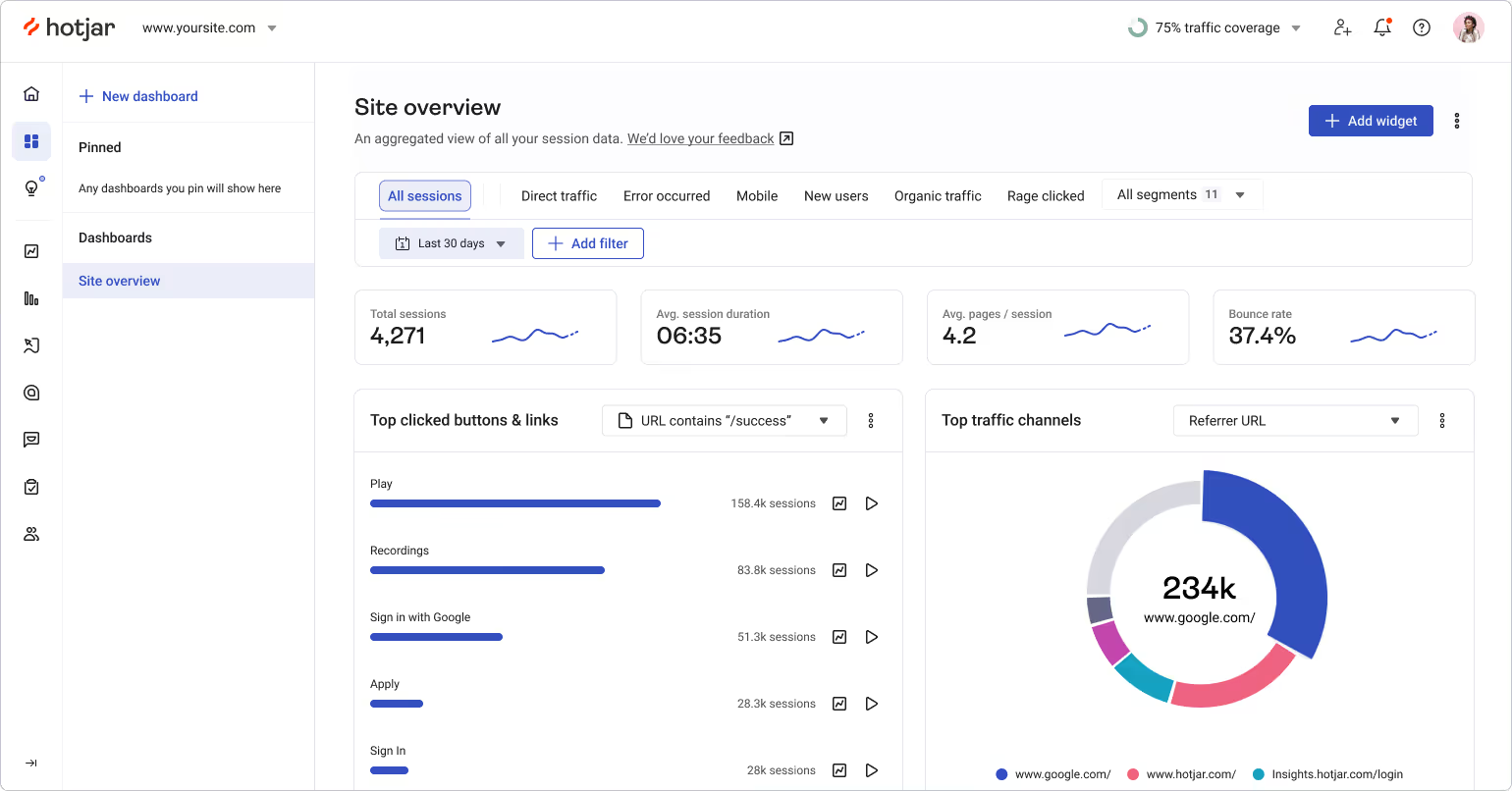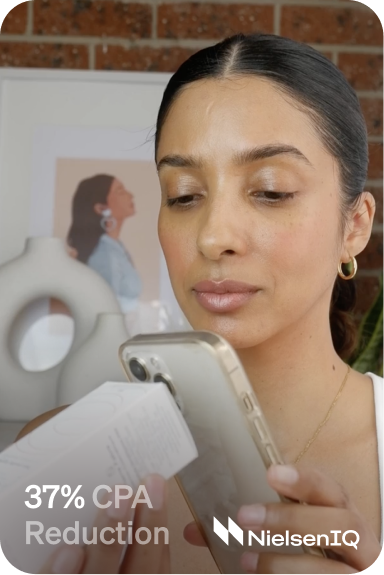90% of startups fail in their first year. This is sometimes – or even often – due to ineffective marketing.
Understanding which marketing strategies can drive growth and deliver results is essential for standing out and succeeding as a startup.
Our team at inBeat, a performance-based digital marketing agency, has compiled insights on the latest trends and proven strategies to help you overcome challenges, connect with your audience, and achieve sustainable growth in 2025.
We’ll cover:
- The latest trends, like AI-driven marketing and short-form video strategies
- Key digital marketing strategies tailored for startups
- How to avoid common marketing mistakes and maximize ROI
- Budget-friendly approaches to achieve sustainable growth
P.S. Struggling to find the right digital marketing strategy for your startup? inBeat Agency is here to help! As a creative growth agency, we specialize in blending paid media with micro-influencer marketing to craft campaigns that align perfectly with your brand. Backed by data-driven insights, we ensure your startup achieves real growth and measurable performance. Book a free strategy call now!
TL;DR:
90% of startups fail in their first year, often due to ineffective marketing. Digital marketing can help overcome these challenges.
Key trends for 2025 include AI-driven marketing, short-form videos, and omnichannel strategies for seamless customer experiences.
Digital marketing is essential for startups because it's cost-effective, enables precise targeting, improves brand visibility, and delivers high ROI.
Top strategies for startups:
- Focus on customer experience with detailed personas.
- Leverage paid communities to build engagement.
- Optimize websites for performance and conversions.
- Use SEO to boost visibility and drive organic traffic.
- Collaborate with micro-influencers and partners.
- Develop funnel-specific content marketing strategies.
- Utilize social media platforms effectively.
- Invest in PPC, retargeting, and email campaigns.
Common mistakes to avoid:
- Misallocating budgets.
- Lacking a cohesive marketing plan.
- Targeting undefined audiences.
- Over-relying on a single channel.
- Ignoring data and analytics.
Budget-friendly tactics include UGC, co-marketing, free tools, and local campaigns.
Data and analytics are crucial for refining strategies and maximizing ROI.
Startups can thrive with the right digital marketing approach, leveraging trends, strategies, and insights for measurable growth.
Digital Marketing Trends for Startups in 2025
Digital marketing is changing rapidly.
That means you have a slew of innovative ways to connect with your target audience, drive engagement, and achieve sustainable growth.
Understanding and leveraging these trends gives you a much-needed competitive edge in a dynamic market.
1. Rise of AI Tools
Artificial intelligence in digital marketing offers startups opportunities to create highly tailored and effective campaigns.
Notably, 69.1% of marketers have incorporated AI into their operations.
Even worse better, 70.6% of these marketers believe that AI can outperform humans in key tasks.
Personalization has also reached new heights with ultra-personalized email campaigns and dynamic ad copy variations that respond to user behavior in real time.
Predictive analytics further enables startups to anticipate customer needs, refine strategies, and optimize conversion rates.
Basically, all these AI-driven capabilities empower startups to work smarter and achieve results faster. To fully leverage AI-driven capabilities, many startups choose to hire AI developers who can build custom solutions tailored to their unique marketing goals.
2. Focus on Video Content
Short-form video content continues to dominate social media platforms like TikTok, Instagram Reels, and YouTube Shorts.
Startups leveraging this trend are seeing massive engagement across different age groups and interests.
Tools like an AI video generator powered by AI twins are also making it easier for creators and brands to produce engaging videos at scale.
Studies show that videos under 90 seconds keep 50% of viewers retained.
Beyond traditional videos, shoppable content is emerging as a key strategy. Interactive quizzes and embedded product links within videos allow startups to engage users while directly boosting sales. Live shopping isn’t that far behind, either.
3. Omnichannel Strategies
Implementing an omnichannel strategy can lead to a 91% higher year-over-year customer retention rate compared to businesses that don't.
Startups are increasingly adopting omnichannel marketing to ensure seamless customer experiences across various touchpoints.
This approach integrates social media, email campaigns, and other digital channels into a cohesive strategy that builds loyalty and maximizes engagement.
Moreover, decentralized platforms like Reddit and Discord are becoming popular choices for startups to create community-driven marketing efforts.
These platforms provide a space for direct interaction and relationship building.
People can even ask for funding directly instead of building a funnel to target potential investors with content first before convincing them.
Like so:

Importance of Digital Marketing for Startups
Digital marketing helps startups distinguish themselves in highly competitive markets.
Its versatility, cost-efficiency, and measurable results make it indispensable.
Key reasons why digital marketing is crucial for startups are:
- Cost-effectiveness: Startups can reach large audiences without overspending. Strategies like social media advertising and email marketing help minimize costs while maximizing results. For instance, email marketing is highly budget-friendly for startups as it offers a remarkable $36 return for every $1 spent.
- Precise targeting: Tools like Google Ads and social media platforms allow startups to define their target audience by demographics, behaviors, and interests. This ensures campaigns resonate with the right people and leads to increased engagement and conversions.
- Improved brand visibility: Establishing a strong online presence builds credibility and helps startups compete even in crowded markets. In fact, 90% of marketers report that social media marketing has significantly boosted their business's visibility. Your startup can benefit from the same results.
“Digital marketing is not an art of selling a product. It is an art of making people buy the product that you sell.” – Hecate Strategy
- Scalability and flexibility: Digital campaigns are highly adaptable as they allow startups to scale them up or down based on budget, objectives, and market conditions. This flexibility enables startups to respond quickly to changes in their environment. A white label website builder is a great example, letting startups adapt their web presence rapidly while maintaining consistent branding.
- Real-time analytics: Platforms like Google Analytics provide immediate feedback on campaign performance. These insights allow startups to refine strategies and make data-driven decisions, improving efficiency and results.
- Higher ROI: Digital marketing tactics like SEO, pay-per-click (PPC) advertising, and email campaigns are known for delivering measurable returns. For instance, PPC advertising offers a 200% ROI, with $2 earned for every $1 spent.
- Lead generation and nurturing: Content marketing and email campaigns attract potential customers and guide them through the sales funnel. These strategies are effective and economical, with content marketing generating three times as many leads as traditional methods while costing 62% less.
- Global reach: Digital channels break geographical barriers and give startups access to international markets and broader audiences. Startups can promote new products or services efficiently through digital campaigns.
11 Effective Digital Marketing Strategies for Startups in 2025
In 2025, startups need to leverage innovative and customer-centric digital marketing strategies to excel in a competitive market.
Experts at inBeat Agency have outlined the following strategies to help you boost engagement, strengthen connections, and achieve sustainable growth for your startup.
1. Focus on Customer Experience
Buyers today expect seamless and personalized experiences.
Meeting these expectations requires a deep understanding of your ideal customers to ensure your marketing efforts are relevant and impactful.
Make sure to develop detailed customer personas by analyzing factors such as:
- Age
- Interests and hobbies
- Geographic location
- Purchasing behaviors
- Income level
- Education level
- Pain points and challenges
- Preferred digital channels (e.g., email, social media)
- Buying motivations (e.g., convenience, cost, quality)
- Decision-making process (e.g., time taken to decide, influence of reviews)
These personas help you tailor campaigns that resonate with your target audience, which in turn results in increased engagement and conversion rates.
Insider’s tip: Tools like Google Analytics and Facebook Insights provide valuable data about your audience's preferences, behaviors, and interactions. You can also leverage surveys, customer feedback, and CRM data to refine these personas. This approach ensures that, as a startup, you effectively address your audience's unique needs and expectations.

2. Use Paid Communities
Paid communities are emerging as a powerful tool for startups to build meaningful connections with their target audience.
Unlike free platforms, paid communities create a more focused and engaged environment where members are invested in the content and interactions.
Such communities offer startups a direct line to customer preferences, challenges, and feedback, which helps refine their offerings and campaigns.
They also serve as a dedicated space for building relationships, generating leads, and enhancing customer loyalty, all while providing valuable insights for sustainable growth.
P.S. Listen to this conversation with Jane Stecyk on the Growth Notes Podcast for deeper insights on building and leveraging paid communities. Jane shares how communities drive growth, build member engagement, and create recurring revenue.

3. Optimize Your Website
A well-optimized website is the cornerstone of any startup’s digital marketing efforts.
It ensures a seamless user experience, builds trust, and boosts engagement.
You can consider these tips to optimize your website:
- Key elements: Ensure fast load times, mobile responsiveness, and clean design to improve user experience and reduce bounce rates. Notably, 53% of mobile users abandon sites that take longer than three seconds to load.
- Interactive features: Integrate tools like chatbots for lead capture or dynamic pricing calculators to engage visitors and drive conversion rates. For instance, businesses using chatbots have seen a 67% increase in sales.
As a side note, mattress startup Casper is leveraging this perfectly with a chatbot that talks to people who can’t sleep:

- Performance: Focus on Core Web Vitals, HTTPS, and AMP (Accelerated Mobile Pages) for better search engine optimization and seamless device performance. Websites meeting Google's Core Web Vitals standards are more likely to rank higher in search results.
- High-converting landing pages: Use clear calls-to-action (CTAs) and compelling content to create landing pages that effectively turn traffic into paying customers. Well-designed landing pages can increase conversion rates by up to 300%.
Pro tip: inBeat experts suggest using AI tools like Vondy, GPT and Gemini to analyze data from platforms such as Reddit, customer reviews, and sales conversations. These insights help you create multiple landing pages that reflect your Ideal Customer Profile (ICP) and resonate with your audience through their language and preferences.

4. Search Engine Optimization (SEO) for Startups
SEO strategies are another critical component of any startup’s digital marketing plan.
It helps improve online visibility and drive organic traffic to your website.
Let’s see how you can make the most of SEO:
- On-page strategies: Focus on optimizing keywords, crafting well-structured content, and writing clear meta descriptions. These elements make your website more search-engine-friendly and improve click-through rates.
- Off-page tactics: Build domain authority through link-building strategies like guest posts, PR mentions, and social sharing. Create tools or content assets that attract editorial links, which further boost your site’s credibility and rankings.
Moreover, you can develop interconnected blog posts around a single keyword cluster to dominate niche topics and establish thought leadership. This approach improves your rankings and enhances the user journey across your content.
Insider’s tip: Our experts at inBeat Agency leverage SEO tools like SEMrush and Ahrefs to gain actionable insights. These tools help refine strategies, monitor long-tail keywords, and track key performance indicators such as rankings and organic traffic to ensure optimal results.

5. Leveraging Influencer and Partner Marketing
Collaborate with influencers to establish credibility and connect with highly engaged audiences.
Focus on partnering with micro-influencers, those with 10,000 to 100,000 followers in your niche.
Their smaller yet loyal follower base ensures authenticity and makes them a cost-effective option for your startup’s digital marketing campaign.
Surveys show that micro-influencers achieve an average engagement rate of 6%, outperforming larger creators in driving meaningful interactions.
Additionally, consider forming strategic partnerships with complementary brands.
Joint campaigns or cross-promotions can help you expand your reach, build trust within overlapping audiences, and achieve your business objectives.
P.S. Wondering where to find authentic influencers for your startup? Influencer discovery agencies like ours can make the process effortless, connecting you with micro and nano influencers tailored to your target market.
6. Content Marketing Strategy
63% of marketers report that content marketing is effective for nurturing leads and engaging audiences.
It is a powerful way for startups to establish authority and build trust within their niche.
Consistently publishing high-quality blog posts, videos, infographics, and eBooks helps educate and engage diverse audiences while enhancing your online presence.
Startups can attract potential customers by addressing audience pain points and sharing relevant content.
To maximize impact, tailor content to different stages of the funnel:
- TOFU (Top of Funnel): Create educational content like blog posts or explainer videos to raise awareness among a wider audience.
We work with Genomelink to launch its new product brand, YourRoots, which focuses on genealogy and family tree building.
With the new brand, we launched a new campaign where we recruit users to share screenshots of their most exciting family map visualization using YourRoots Map and use them for paid social creatives.
.png)
.png)
- MOFU (Middle of Funnel): Share product comparisons, webinars, or email newsletters to nurture interest and guide target customers closer to making a decision.
Genomelink creates educational content, e.g., blog posts and Instagram ads, to showcase its app's features and enhance brand awareness.
The company created this detailed FAQ-like post of its app on its website to help potential customers choose the best option for their needs.

- BOFU (Bottom of Funnel): Develop conversion-focused content like customer testimonials, product demos, special discounts or limited-time offers to encourage action and improve conversion rates.
Genomelink provides limited-time offers and special discount bundles through email, social media, and their website to convert interested leads into paying customers.

Moreover, Genomelink also partners with influencers, showcasing testimonials from different niche creators to highlight health benefits and nurture interest.
In addition, a strong repurposing framework can amplify your efforts; for example, transform a single webinar into blog posts, LinkedIn updates, and social media snippets.
This approach boosts efficiency and ensures your content marketing efforts reach a broader audience.
7. Social Media Marketing
To connect with your target audience effectively, start by selecting the right social media platforms.
Since each platform caters to specific demographics, ensure your choices align with your audience’s preferences.
- Facebook: Ideal for broad audience engagement, community building, and running targeted ads.
- Instagram: Best for visual storytelling, influencer collaborations, and engaging younger demographics.
- LinkedIn: Perfect for B2B marketing, professional networking, and sharing thought leadership content.
- Twitter: Useful for real-time updates, customer interaction, and trending topic engagement.
- TikTok: Excellent for short-form video content targeting Gen Z and millennials.
- Pinterest: Suitable for visually-driven businesses like fashion, design, and DIY industries.
Next, claim and optimize your business profiles on major platforms immediately.
This prevents others from registering your username, which could cause branding challenges later on.
Once your profiles are set up, focus on maintaining consistency.
Use a content calendar to plan regular updates, ensuring your brand stays visible and relevant.
To keep your audience engaged, interact with them through replies, live videos, and polls.
These strategies build a strong community and help your brand establish trust and credibility over time.

8. Paid Advertising (PPC) and Retargeting
PPC is a cost-effective way for startups to gain instant visibility.
Platforms like Google Ads allow you to target intent-driven search traffic, while Facebook and Instagram provide access to highly specific social audiences.
Even with a limited marketing budget, PPC campaigns can be optimized to deliver maximum ROI by focusing on precise targeting and cost-efficiency.
Retargeting ads further amplify these results by re-engaging users who have previously interacted with your website or social media.
Research shows that retargeting campaigns can perform nearly 10 times better than regular display ads, with CTR averaging 0.7% compared to standard display ads (0.07%).
Pro Tip: We suggest monitoring performance regularly and using A/B testing to refine your ad copy, visuals, and CTAs for improved results.
Try this free mockup ad generator, a powerful tool to test variations and identify what resonates best with your audience.

9. Email Marketing and SMS Campaigns
Email marketing continues to be one of the most cost-effective strategies for startups due to its impressive ROI.
You can make the most of these strategies by:
- Building your email list: To attract subscribers, offer incentives like free guides, exclusive discounts, or early access. Strategically placed CTAs can help grow your list quickly and effectively.
Example: Accor Hotels successfully leverages this approach by offering special discount promotions through email campaigns. This strategy encourages customers to subscribe and stay updated on deals.

- Using drip campaigns: Nurture leads over time with automated email sequences. Pair these with regular newsletters to keep your audience updated and engaged.
- Leveraging SMS marketing: Use SMS for time-sensitive offers, appointment reminders, or personalized messages that demand immediate attention. Implementing an automated appointment reminder system ensures clients receive timely SMS or email notifications, reducing no-shows and improving customer satisfaction.
- Sending behavioral trigger emails: Automate emails based on user actions, like cart abandonment or browsing history, to deliver highly personalized content.
Insider’s tip: Platforms like Mailchimp and Sendinblue (Brevo) make it easy to manage and automate both email and SMS campaigns. These tools also allow you to implement trigger-based campaigns effortlessly and ensure your messaging aligns with user behavior and drives results.

10. Referral and Word-of-Mouth Marketing
Referral and word-of-mouth marketing provide startups with an effective way to grow their customer base organically.
Implementing a referral program can motivate satisfied customers to refer friends and family by offering incentives such as discounts, rewards, or exclusive perks. These programs drive new customer acquisition and build loyalty among existing customers.
To further amplify your efforts, identify loyal customers who can act as brand advocates or ambassadors.
These individuals naturally champion your brand by sharing their positive experiences, either through social media posts, reviews, or personal recommendations.
For example, one of our clients, Hopper, runs an engaging referral program that rewards users with travel credits.
Customers can easily earn credits toward their next trip simply by referring friends to the platform.

11. Measuring Success with Analytics
For startups, tracking performance is essential to ensure digital marketing efforts deliver measurable results.
Identify and analyze crucial key performance indicators (KPIs) such as:
- Website traffic: Tracks the number of visitors and their sources.
- Bounce rates: Measures the percentage of visitors leaving without interacting.
- Conversion rate: Evaluates how many visitors take desired actions, like signing up or making a purchase.
- Click-through rate (CTR): Tracks how effectively your content or ads encourage clicks.
- Customer acquisition cost (CAC): Assesses the cost of acquiring a new customer.
- Customer lifetime value (CLV): Projects the revenue a customer will generate over their lifetime.
These metrics provide valuable insights into what's working and where improvements are needed and allow you to refine strategies to meet your business objectives.
As a startup, you can leverage free tools like Google Analytics, Google Search Console, and Hotjar (Basic Plan) to gain access to comprehensive data.
These tools offer valuable insights into audience behavior, campaign performance, and optimization opportunities.
Regularly iterating on your strategies based on analytics ensures continuous improvement, sustainable growth, and maximum ROI for your startup.

9 Budget-Friendly Strategies for Startups
For startups working with limited resources, effective budgeting and strategic planning are essential to achieve growth.
Some cost-effective strategies to maximize impact without overspending are:
- Prioritize spending on high-return strategies: Allocate your budget to proven methods like PPC advertising for immediate visibility or content marketing for sustained, long-term growth.
- Leverage organic social media: Utilize platforms like Instagram, Facebook, and LinkedIn to promote your brand for free. Regular posting and engagement build brand awareness and foster connections with your audience.
- Invest in SEO: Optimize your website to rank higher on search engines and drive consistent organic traffic without recurring costs.
- Use free marketing tools: Tools like Canva, Mailchimp (free tier), and Google Analytics provide affordable solutions to create, manage, and measure your marketing campaigns effectively.
- Encourage user-generated content (UGC): Inspire your customers to share reviews, photos, or videos featuring your brand. UGC enhances authenticity and serves as an organic promotion.
- Implement referral programs: Reward satisfied customers with discounts or perks for referring others, a low-cost strategy for gaining new customers.
- Leverage community platforms: Engage with audiences on forums like Reddit, Quora, or Facebook Groups. These platforms help startups connect directly with niche audiences and establish credibility.
- Run local campaigns: Use tools like Google My Business and collaborate with local partners to boost your visibility within the community.
- Participate in co-marketing: Partner with complementary startups to share resources and run joint campaigns, expanding your reach without additional expenses.
5 Common Mistakes Startups Make in Digital Marketing
Startups often face unique challenges in digital marketing, and avoiding these common mistakes can make all the difference:
1. Not Investing Their Budget Correctly
Misallocating funds to ineffective channels or neglecting high-impact strategies can quickly drain resources.
For example, not using A/B testing to optimize campaigns because it means spending money is a mistake.
More often than not, it results in missed opportunities to improve conversion rates and maximize ROI.
2. Lack of a Cohesive Plan
Running campaigns without a clear digital marketing strategy leads to inconsistent messaging and fragmented results.
Startups need a well-defined roadmap to align all efforts with their business objectives.
3. Undefined Audience
Marketing without a clear understanding of your target audience reduces efficiency and effectiveness.
Create detailed customer personas to ensure campaigns resonate with the right people and deliver measurable outcomes.
4. Over-Dependence on One Channel
Relying solely on social media or paid ads limits reach and scalability.
Diversifying across marketing channels, such as email campaigns, content marketing, and SEO, broadens your audience and mitigates risks.
5. Neglecting Data
Lastly, ignoring analytics tools and key performance indicators prevents startups from identifying what's working and where adjustments are needed.
Regularly monitoring metrics like website traffic, bounce rates, and CTR ensures ongoing campaign optimization and growth.
“It's not what you sell that matters as much as how you sell it!” — Brian Halligan, CEO & Co-Founder, HubSpot
Take Your Startup to the Next Level with inBeat Agency's Digital Marketing Expertise
To sum up, digital marketing offers startups an opportunity to scale effectively, engage their audience, and build a sustainable brand presence.
However, success lies in understanding the latest trends, implementing tailored strategies, and continuously refining efforts to achieve measurable growth.
Startups that leverage these approaches can thrive even in the most competitive markets.
Key takeaways:
- Focus on customer experience by creating detailed personas and tailoring campaigns to their needs.
- Leverage paid communities to build deeper connections and enhance engagement.
- Optimize your website for speed, mobile responsiveness, and high-converting landing pages.
- Implement SEO strategies to boost online visibility and drive organic traffic.
- Collaborate with influencers and form strategic partnerships to expand your reach.
- Develop a content marketing strategy that addresses every stage of the customer funnel.
- Choose the right social media platforms and maintain consistency in engagement.
- Use PPC and retargeting ads to maximize ROI and re-engage your audience.
- Build strong email and SMS campaigns with personalized and trigger-based messaging.
- Avoid common mistakes like undefined audiences, neglecting analytics, and over-dependence on a single channel.
If you’re ready to elevate your digital marketing efforts but don’t know where to start, inBeat Agency can help.
Our team specializes in crafting data-driven campaigns and blending micro-influencer marketing with creative strategies.
Let us handle your digital marketing needs while you focus on growing your business.
Book a free strategy call now!
Frequently Asked Questions
Is digital marketing good for startups?
Yes, digital marketing is essential for startups as it provides cost-effective ways to reach targeted audiences, build brand awareness, and drive measurable growth.
How much should a startup spend on digital marketing?
Startups should allocate 6-12% of their revenue to digital marketing, depending on their growth goals and budget.
Can I do digital marketing for my own business?
Yes, many startups begin by managing their own digital marketing using free tools and resources. However, expertise can significantly improve results.
Should entrepreneurs learn digital marketing?
Learning digital marketing is beneficial for entrepreneurs as it helps them understand strategies, track performance, and make informed decisions.
Why is social media marketing important for startups?
Social media marketing allows startups to connect with their audience, build brand loyalty, and promote their products or services effectively on platforms where their customers spend time.





.svg)
.svg)
.svg)
.svg)


.svg)










